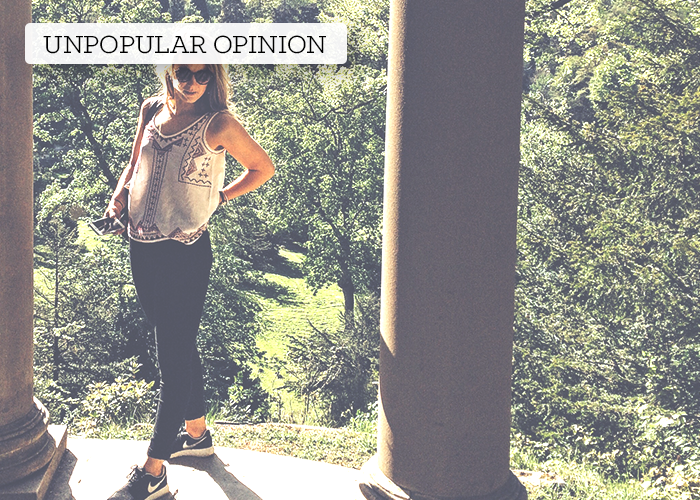Why I Stopped Aggressively Paying Off My Student Loans

The personal finance blogs I follow are (likely) the same blogs you follow, so you know there’s that recurring theme: Your debt is a prison. Pay if off, as soon as possible, no matter what it takes.
With my bachelor’s degree and $30,000 signed out to my social security number, I moved back in with my parents to begin my debt-free journey. Since I had a gap semester before applying to graduate school, I began working at my local hospital making $14/hour. In my department, we had the added bonus of extra hours and lots of time-and-a-half opportunities, which I definitely took advantage of. The more you hustle, the faster you can be free, right? That summer I averaged over 40 hours a week, which is saying something considering I was only part-time, taking a summer class, and was gone for a week-long vacation.
For my debt, I utilized a hybrid of the snowball and tsunami repayment methods. That is to say, I focused my payments on the lowest loan balance (snowball method), but also one that felt mentally draining (tsunami method). Between December 2014 and October 2015, I paid off $18,000 of my loans. They were all from alternative sources (non-governmental), and it was a huge relief. Federal loans can always be deferred, canceled, or set on an income-based repayment plan, which are luxuries that the alternative loan sources do not offer.
Once the alternative loans were wiped out, I kept with the spirit of freedom and happiness and debt-zero dreams, and I continued to pay all my disposable income to the federal loans. This was roughly $500/month, which was double the expected payment. Instead of feeling encouraged, I began to feel drained. The overtime caught up to my body while the mental pressure to stay ahead overwhelmed my mind. My side hustles petered out, and as my income decreased, I was on a total spending fast. Any necessary purchase, even gas for my vehicle, left me feeling guilty.
When I finally did splurge, it was for a road trip to visit college friends. One conversation made me rethink my whole strategy. My friend was graduating that spring with her degree in education, and she would be starting a job at a high school in the area. Being a rural, public school teacher, if she stayed committed for two years (which was easy for her, considering she’d already been on her own and she liked the area), 35% of her federal loans would be canceled. Wiped out. Completely forgiven. It’s a reward program wherein the government encourages graduates to serve in a rural community. Most of these rural areas have a difficult time recruiting and retaining staff, so the incentive ensures that someone will fill the position.
I was so jealous. Here I was, busting my butt, sacrificing my weekends, and policing myself in order to pay off interest that benefits the government, while she faces her future calmly and sees an actual light at the end of the tunnel. Then I realized: I am hoping to enter the healthcare field. Once I complete professional school, that could be me.
That’s why I stopped paying all my disposable income to the government. I still throw in a few extra dollars every month (rounding the expected $220 up to $250 or $300), but I’m also directing money into savings for emergency fund growth, my IRA, and my (new) travel fund. I also purchase one fun thing for myself each month. Recently, I bought some boxing gloves to inspire my workouts. Last month, it was a new cactus (my obsession). Without being frivolous, my fun purchase is a pre-planned, happy gift for myself.
This new outlook is not only a mental relief (no more picking up extra shifts at a job I hate!), but it is logical for me. With my biology degree, the best next step is a graduate school of some kind and that comes with a price tag. If I chose to pay off all my undergraduate loans, I would only be zeroing out my current debt before signing up for more.
Some people thrive off of shopping bans, and if that’s you, go for it. Some people have a reason to become debt-free as soon as possible, like preparing for marriage or kids. Some people need a detailed budget. You have to decide what is right for you. Personally, my monthly purchase and my savings account growth inspires me more than the number on my loans decreasing. Then when I get out of graduate school, I will participate in a loan forgiveness program and provide service to a rural community. In the meantime, I will build my credit score and save for my dream trip to Machu Picchu.
If you’re interested in learning more about what inspired my decision, there are several programs for loan forgiveness that you can check out. Some require that you be in government service and pay your loans consistently for a minimum of 10 years. Other programs that pay immediately after service are funded by the military, education corps, or national healthcare corps. The type of cancellation referenced earlier is a program specifically for teachers, and it only requires the two years of service. I recommend doing some research, and to start, this is the official government website.
Emily is a post-grad who decided that one degree isn’t enough. In between graduate school applications, she is admiring the natural world, becoming a foodie, and training in kickboxing. Emily hails from Minnesota and eats hotdish on a weekly basis.
Image via Unsplash




